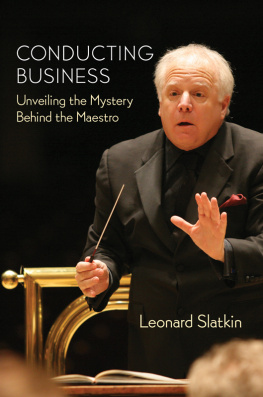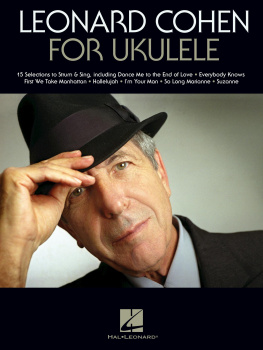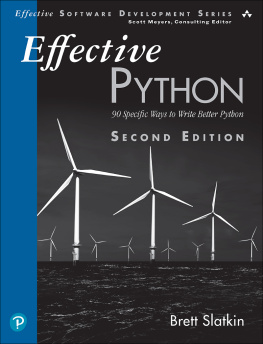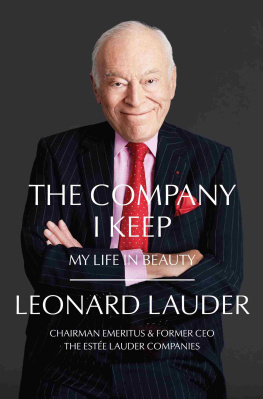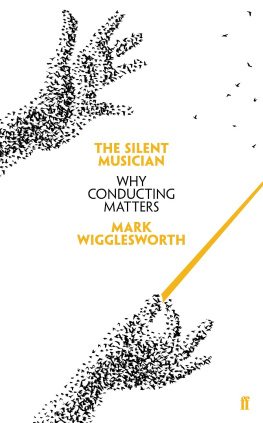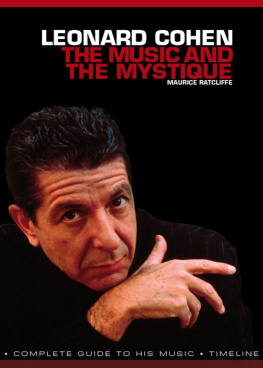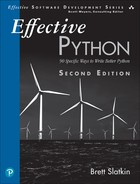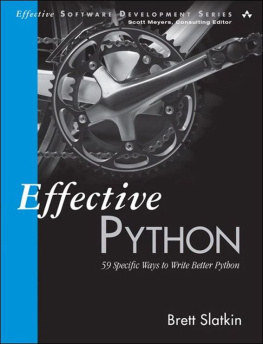Leonard Slatkin - Conducting Business
Here you can read online Leonard Slatkin - Conducting Business full text of the book (entire story) in english for free. Download pdf and epub, get meaning, cover and reviews about this ebook. year: 2012, publisher: Amadeus, genre: Non-fiction. Description of the work, (preface) as well as reviews are available. Best literature library LitArk.com created for fans of good reading and offers a wide selection of genres:
Romance novel
Science fiction
Adventure
Detective
Science
History
Home and family
Prose
Art
Politics
Computer
Non-fiction
Religion
Business
Children
Humor
Choose a favorite category and find really read worthwhile books. Enjoy immersion in the world of imagination, feel the emotions of the characters or learn something new for yourself, make an fascinating discovery.
- Book:Conducting Business
- Author:
- Publisher:Amadeus
- Genre:
- Year:2012
- Rating:4 / 5
- Favourites:Add to favourites
- Your mark:
- 80
- 1
- 2
- 3
- 4
- 5
Conducting Business: summary, description and annotation
We offer to read an annotation, description, summary or preface (depends on what the author of the book "Conducting Business" wrote himself). If you haven't found the necessary information about the book — write in the comments, we will try to find it.
Conducting Business — read online for free the complete book (whole text) full work
Below is the text of the book, divided by pages. System saving the place of the last page read, allows you to conveniently read the book "Conducting Business" online for free, without having to search again every time where you left off. Put a bookmark, and you can go to the page where you finished reading at any time.
Font size:
Interval:
Bookmark:
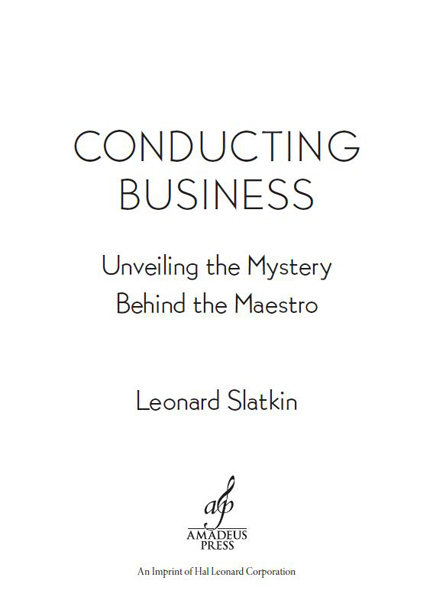
Copyright 2012 by Leonard Slatkin
All rights reserved. No part of this book may be reproduced in any form, without written permission, except by a newspaper or magazine reviewer who wishes to quote brief passages in connection with a review.
Published in 2012 by Amadeus Press
An Imprint of Hal Leonard Corporation
7777 West Bluemound Road
Milwaukee, WI 53213
Trade Book Division Editorial Offices
33 Plymouth St., Montclair, NJ 07042
Book design by Mark Lerner
Photographs in this book are courtesy of the Slatkin family.
Every reasonable effort has been made to find copyright holders and secure permission. Any omissions brought to our attention will be remedied in future editions.
Library of Congress Cataloging-in-Publication Data
Slatkin, Leonard.
Conducting business : unveiling the mystery behind the maestro / Leonard Slatkin. -- 1st hardcover ed.
p. cm.
1. Conducting. I. Title.
MT85.S56 2012
781.45--dc23
2012016970
www.amadeuspress.com
For Cindy
My companion and inspiration
The aim and final end of all music should be none other than the glory of God and the refreshment of the soul.
Johann Sebastian Bach
Music is the divine way to tell beautiful, poetic things to the heart.
Pablo Casals
To be a true artist you have to play the way you feelnot the way others think you should feel.
Don Ellis
Show me an orchestra that likes its conductor and Ill show you a lousy conductor.
Goddard Lieberson
Contents
There will come a time when you believe everything is finished. That will be the beginning.
Louis LAmour
There is an old joke about the audience member who comes up to the conductor after a performance. Having heard a full program, she says, That was lovely. What do you do for a living?
At one time, this question would have hardly surprised him. Conducting an orchestra or playing in one was a part-time job. And, back then, it was a him. These days, salaries for musicians at the higher levels are not only competitive with other fields, the income may even exceed some peoples wildest dreams. A simpler way to pose the question is, So, what do you do? period!
The orchestral conductor is a relatively new species, having originated in the nineteenth century. In just under two hundred years, conducting has evolved into an extremely complicated profession. It requires much more than wielding the baton, score reading and the ability to listen. The conductor also serves as father, mother, psychologist, teacher, referee and many other roles to his hundred-plus orchestra members. He or she operates as a CEO, a visiting team leader, a production supervisor and a social butterfly. The willingness to participate in fund-raising and a knack for those activities have become necessary duties in todays musical marketplace.
Conducting Business answers the question of what we do. The book is essentially about the profession; it is not a manual on how to conduct. Numerous volumes have been written about conducting technique. The professions history, likewise, has been well documented. Biographies abound in print, but not much exists to explain what the conductor actually does on an everyday basis. How do we study? Do we need a stick? What is our relationship to the composer? Where is the stage door? I try to unravel the mysteries of a most misunderstood profession. And, I have tried to remove some barriers that stand in the way of those who are attempting to unlock the secrets of the baton in pursuit of a conducting career.
It was not my intention to write an autobiography, but when I began the book and its ideas developed, I realized that stories about my own life and the people who helped shape my career would provide a more thorough understanding of how a conductor comes into being.
So, in the first of the books three parts, I tell about my background, education and experience, my personal path to the podium. As my dreaming shifts to becoming, the second part gradually moves away from my chronological life story and into greater detail about the challenges every podium minder faces. The final section offers answers to questions I often am asked. Another chapter shows ten problematic musical examples and illustrates how the conductor figures out and solves them.
Part One
In many ways, I was just a normal kid, going to public schools, playing ball with the guys and blaming my brother for everything. Most of my friends were in the school band and orchestra. The big difference between them and me was that when I got home, it was practice, practice, practice. Once, when my pals wanted me to come outside and play, I actually stopped pounding on the keyboard and brought my baseball glove to the front door. My mother threatened to lock up the piano if I did not finish my Czerny. I did not believe her, and out the door I went. Upon returning home, sure enough, she had secured the lid of the keyboard and it could not be opened.
I was in heaven. No more scales, arpeggios or exercises in thirds. After a few days passed, I started to feel lonely. Beethoven and I were just getting acquainted with each other and I missed him. My mom would not budge. Screaming, kicking and yelling did me no good. Only when I finally agreed that practicing came first was the lid unlocked and a newfound lifestyle kicked in.
With virtually everyone in my family a part of the music industry, I had a front-row seat to witness the degree of discipline these music professionals applied to their work. My parents, devoted to film industry soundtracks, chamber music, popular recording and freelance classical performance, certainly packed a lot into their lives. Sadly, as much as they might have tried, raising a couple of children did not come so naturally. My brother and I grew up as independents, struggling to fathom the perpetual stress that seemed to surround us. Eventually, we managed to figure it out, and despite the obstacles, both of us have done well in our chosen musical careers.
The books second chapter elaborates on our familys rich musical history. My mother came from a musical dynasty which originated in the Ukraine and my father, likewise of Russian heritage, possessed musical gifts so prodigious that he more than compensated for the fact that he was the sole talent on that side of the family. To grow up in Los Angeles with parents who were stars in the musical firmament enabled us to get to know practically every prominent musician on the West Coast. Imagine the likes of Frank Sinatra, Arnold Schoenberg, John Williams, Art Tatum, Andr Previn and Jascha Heifetz visiting your home! These acquaintances led to a variety of wonderful anecdotes, a number of which I recount in Part One.
Living in a household filled with musical talent should have given me a strong head start in the field and an easy transition into the profession. But this was hardly the case. Personal tragedy also made things very difficult. My father died at the age of forty-seven and his passing dramatically altered life for me. I left the musical fold for a little while, but with encouragement from friends and family, decided to pursue the path my dad had begun to forge for himself, that of conducting symphonic ensembles.
It was my good fortune to learn from two of the finest, Walter Susskind and Jean Morel. These two opposite personalities, plus the disparate disciplines of Aspen and Juilliard, provided the necessary technical skills I needed to make progress on the path to professional conducting. However, as this book repeatedly demonstrates, conducting is about so much more than just waving a stick.
Font size:
Interval:
Bookmark:
Similar books «Conducting Business»
Look at similar books to Conducting Business. We have selected literature similar in name and meaning in the hope of providing readers with more options to find new, interesting, not yet read works.
Discussion, reviews of the book Conducting Business and just readers' own opinions. Leave your comments, write what you think about the work, its meaning or the main characters. Specify what exactly you liked and what you didn't like, and why you think so.

